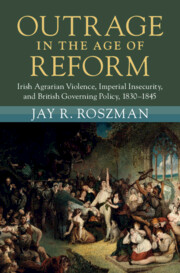 Outrage in the Age of Reform
Outrage in the Age of Reform Published online by Cambridge University Press: 15 September 2022
Confiding in his diary in May 1835, the 4th Duke of Newcastle, an ardent Protestant and ultra-Tory, summarised his opinion of the prevailing mood in Parliament as it reconvened by stating: ‘If a man now wishes to be popular he calls himself a staunch Protestant + talks of defending his Religion + his Church – rails against Popery and advocates [the] conservative principles of the Institutions of the Country.’ Just a few days earlier he had praised God for ‘burying all things à tout’ and bringing back ‘a Protestant feeling … recommencing with considerable ardour’. These statements by Newcastle seem somewhat incongruous with the political realities of British politics in 1835. While the Tories had won seats in the recent elections, these victories were not enough to sustain Peel’s minority government, which fell in April. Worse still, the Whigs found parliamentary support from the most nefarious possible source – Daniel O’Connell and his ‘tail’ – a connection secured in the Lichfield House Compact, discussed in Chapter 3. How could Newcastle conclude that ‘Right feeling [was] making wonderful progress’ in the midst of such dire political realities?
To save this book to your Kindle, first ensure [email protected] is added to your Approved Personal Document E-mail List under your Personal Document Settings on the Manage Your Content and Devices page of your Amazon account. Then enter the ‘name’ part of your Kindle email address below. Find out more about saving to your Kindle.
Note you can select to save to either the @free.kindle.com or @kindle.com variations. ‘@free.kindle.com’ emails are free but can only be saved to your device when it is connected to wi-fi. ‘@kindle.com’ emails can be delivered even when you are not connected to wi-fi, but note that service fees apply.
Find out more about the Kindle Personal Document Service.
To save content items to your account, please confirm that you agree to abide by our usage policies. If this is the first time you use this feature, you will be asked to authorise Cambridge Core to connect with your account. Find out more about saving content to Dropbox.
To save content items to your account, please confirm that you agree to abide by our usage policies. If this is the first time you use this feature, you will be asked to authorise Cambridge Core to connect with your account. Find out more about saving content to Google Drive.